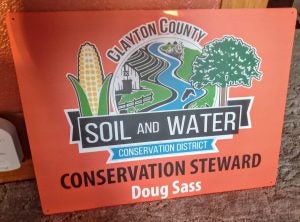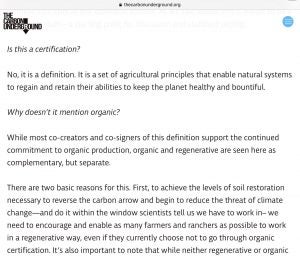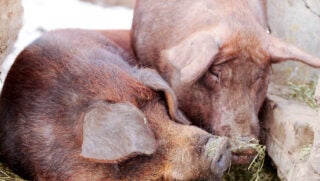We are regenerative farmers. Not organic, not “non-GMO,” but regenerative.
I think.
What does that actually mean?!?
In a time where food companies and labels dominate, it seems as if there’s always a new buzzword out there to try and differentiate from other types of farms. Based on the momentum “regenerative” gained in 2019, the term is on target to be one of the biggest food trends for 2020.
In my opinion some of these labels are a bit disheartening because it tends to pit people against one another; putting another production method down in order to gain market share isn’t always the most ethical thing to do — particularly so if done in a deceitful or manipulative way. The old saying, “If you can’t say something nice, don’t say anything at all,” or, “Treat others as you want to be treated,” goes pretty far in my personal life mantra and kindness goes a long way.
There is one thing that’s happened on our farm recently, and that’s this award:

I’m very proud of my partner, Doug, for earning this. Only one farm landlord and one farm tenant (we both own and lease farmland) receive it in the county, and I’m so proud of all the work he’s done to rightfully earn and deserve this honor.
But how did he do it? And do we deserve a special label for our efforts? Should we get paid more for our grain by doing what’s best for the planet?
Well, sure. I’d love to see that happen, but unfortunately it doesn’t seem to be a mainstream option at this point. There is one company I know of — Grounded Growth — that is working on making this a reality for farmers. However, they still tout “Non-GMO” on some of their crops that don’t even have GMO counterparts to begin with (a bit misleading), and it’s sort of in the early stages of business.
Doug’s brother is a soil scientist, and we always tend to happily be the guinea pigs when it’s time to try something new when it comes to water and soil conservation. This is why we try new types of soil testing measures; been doing “no till” farming for over 20 years. We rotate crops that put nutrients back in the soil and are avid lovers of cover crops. All of these measures preserve topsoil, reduce erosion, and improve organic matter, among other things.
So by definition, we’d be pretty “regenerative,” but I believe this is part of the challenge.
How do we define it? Some people believe that regenerative is the next level of organic, (is our food “organic enough?”) but the major players behind the concept include all types of labels and farms. While I can’t get behind everything the “Carbon Underground” says about agriculture, this is an interesting statement on their website:

I can get behind this. Any farmer can do a great job regardless of size or label and by including them we really can all work together to improve soil health, the planet, and help combat climate change.
“Regenerative” is hard to define, it’s true. A definition, not a certification, which could include all farm labels and bring people together to learn from one another and “grow” as a society to do what’s best for our future.
Michelle Miller, the Farm Babe, is an Iowa-based farmer, public speaker, and writer, who lives and works with her boyfriend on their farm, which consists of row crops, beef cattle, and sheep. She believes education is key in bridging the gap between farmers and consumers.



